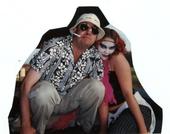The Living Dead in a Post 9/11 World: George A. Romero's Land of the Dead
The fourth installment of George A. Romero's dead series was 2005's Land of the Dead. The film follows a small city living among the dead which, at this point in the series, has overrun the world. The film takes place in a city based on Pittsburgh where there are two classes living inside the walls of the city. One class consists of the upper class which lives in a high-rise called Fiddler's Green run by a man named Kaufman and the other class consists of a lower class that makes runs to the outlined towns raiding the towns for basic needs: canned food, medicine, etc…..
The zombies in this series have evolved to the point of being able to communicate with each other. The film does open up with seeing that the zombies seem to be "living" and carrying on with their daily "lives". The main zombie, a former gas station mechanic, comes out of the gas station when hearing the bells near the gas pump. The evolution of the zombies is a continuation from Day of the Dead where Dr. Logan says that he can domesticate them. The zombies have, in fact, become more like the living at this point.
Romero has said that he wrote the script to address such issues as poverty and AIDS, but when 9/11 happened, he shelved it because America was not ready to deal with such hard issues. After a couple years, Romero pulled the script and said that the issues today was relevant to do Land. Land, indeed, addresses the issues of a post 9/11 world. Every aspect of the film is a metaphor to what is happening with the government and the world around us.
Fiddler's Green is a huge metaphor for how the rich and privilege live so much above the rest of the society. The people in Fiddler's Green live their daily lives forgetting about what is on the outside of their walls. The upper class like the zombies have gotten back to a kind of normality. One can make the parallel of today's society where the upper class has basically forgotten how bad the world is outside of their walls. The character of Kaufman, played by Dennis Hopper, is basically a Rumsfeldian caricature overlooking his society. Kaufman is the leader of a quasi-government. He has a group of advisors that give him ideas about how to run his "country". He doesn't seem to be worried about the zombies or the people on the outside of his tower. One thing that Kaufman does is to get rid of people who pose a threat to him and his world.
The most obvious metaphor the Romero innacted in Land was his use of military as the main defense of Fiddler's Green. The military in this film is primarily made up of a ragtag group of citizens who basically botch their defending of the city. One could argue that this military is in itself a metaphor for the botched wars in the Middle East and Afghanistan.
The people on the outside of Fiddler's Green basically live in a slum and fend for themselves. The only thing that Kaufman has done for them is to give them vices to keep them in line. The character Riley, played by Simon Baker, has taken upon himself to protect the people living in the slums and is a leader to them. When Cholo, played by John Leguizamo, steals Dead Reckoning (which was the former title of Land), Riley with a group agrees to steal it back for Kaufman. Riley isn't doing it for Kaufman, but knows the consequences of Cholo's action if he fires upon the city.
The zombies make their way to the city and finally make it to and thought the walls of Fiddler's Green. They represent a metaphor of the middle class coming to devour the upper class and take away what was theirs in the first place. They overrun the people inside, in a way, make a way back to normality to them and the world that they exist. At the end of the film, the group see the zombies leaving the city and he decides not to kill them. The character Slack, played by Asia Argento (daughter of Dario Argento who helped with Romero's Dawn of the Dead) asked Riley why he didn't fire upon them. Riley responds by saying, "They are just looking for a place to go." Riley's line reflects a subconscious yearning of where do we (the American populous) go from here.
Romero has always defended his work by saying there is something political about his films, in particular, his dead films. He goes on by saying they are ultimately about revolution. Land is probably Romero's most political film up to date with everything a metaphor for what's happening in a post 9/11 world.
Subscribe to:
Post Comments (Atom)

1 comment:
Where is your latest entry? Will you be writing on any soft pornography? I see many fruitful insights arising from your thoughts upon the proliferation of images of the body as both a sight for carnal delights and as a body sighted as a marker for social and biological carnage within a culture of corporate greed. Night Rhythms might be a good starting point...then Dawn of the Dead (all 3 versions)...
Post a Comment